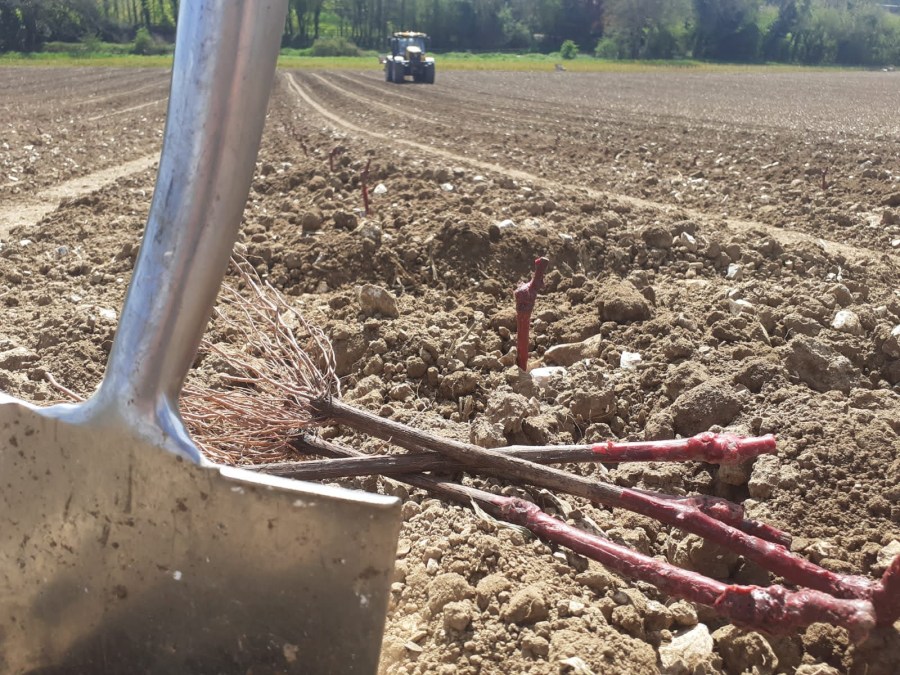The 2024 UK vineyard planting season is drawing to a close. While most new vines ordered continue to be Chardonnay, Pinot Noir and Pinot Meunier, there is an ever-increasing proportion of PiWis being put into the ground. PiWi is short for the German term PilzWiderstandsfähig, translated as fungus resistant.
Last year, VineWorks planted a cumulative total of over 270,000 PiWi vines, the equivalent of almost 60 hectares. Seyval Blanc and Solaris are the most planted PiWis in the UK, but we are seeing an increasing interest in Cabaret Noir, Divico, and Sauvignac. This mirrors developments in many European countries. Bordeaux and Champagne have approved PiWis/cépages résistants (Floréal, Sauvignac, Souvignier Gris and Vidoc Noir in Bordeaux, and Voltis in Champagne) to overcome the specific challenges they face, while in Germany, the area planted with PiWis has increased by 355% in five years to 507 hectares.
While the number of spray applications in the UK will be considerably fewer than for the commonly planted Champagne varieties, PiWis will require the same level of attention in all other aspects – pruning, canopy and yield management and vineyard floor management. What they do offer are lower spray costs, reduced risk of yield lost to disease, and in some cases, higher potential yields to begin with.
Winemaking potential
One key area where there are many unanswered questions is winemaking as the level of knowledge of traditional grapes, accumulated over centuries, is simply lacking with new varieties. Commercialisation on a serious scale is only just beginning with premium producers in Europe now planting PiWis in their most desirable sites.
It is fair to say that everyone is learning, but the initial signs are encouraging.
Gareth Davies of Divergent Wines, the producer of Fitz, said: “We’ve been working with Cabaret Noir since I stumbled upon the varietal in 2018. We now have some planted with our vineyard partner, Heartenoak, with the first fruit coming off in 2022. Perfectly clean, with fairly compact bunches and small berries, giving a great skin to pulp ratio – you can really see the Cabernet Sauvignon parentage.”
While varietal wines and single vineyard bottlings are popular trends, we should also consider wines that are based on blends. In Champagne, Voltis, a PiWi variety, has been approved to comprise up to 10% of the final blend. In Bordeaux, PiWis have been approved for planting, to form parts of blends as the region adapts to climate change.
As well as earlier ripening varieties, some PiWis can potentially be harvested later due to their lower susceptibility to Botrytis, increasing their suitability for still wines. Martin Vickers said: “At Halfpenny Green we have recently made some outstanding wine from Cabaret Noir for one of our contracts. We believe this variety ticks all the boxes for sustainability in that it needs almost no fungicides, crops, and ripens adequately and is very marketable. Sauvignac I feel is in exactly the same category for white wines… From all aspects I feel PiWis are the future, alone or as a blending tool.”
The benefit of being a new winemaking region is the scope for innovation, and at VineWorks we are excited to play a role in the fast-evolving area of PiWis. We work closely with vine nurseries and clients to select the best PiWi and rootstock combinations for new vineyard plantings.
Sam Middleton is a Junior Viticulturist with VineWorks and former winner of the Vine Grower of the Year Award.
Learn more about PiWis
- Pigott, S. & Redes Sidore, P., PiWis are the Next-Gen Grapes, Wine Industry Advisor, 7 Nov 2024.
- Middleton, S., Disease Resistant Grapevines for UK Vineyards – Vine Grower of the Year 2019 research report, www.vine-works.com, April 2024




